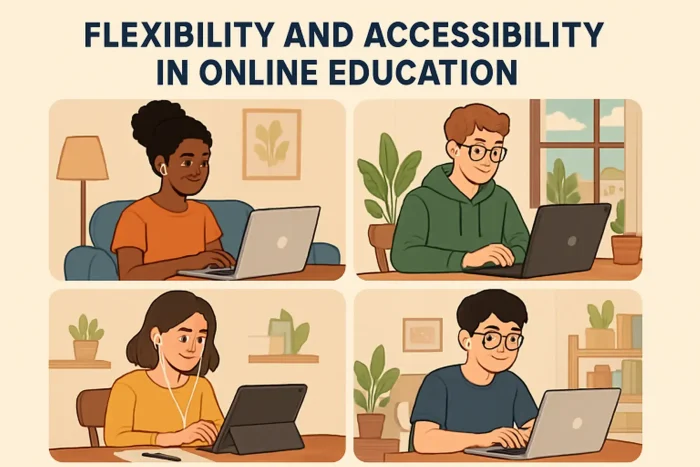Key Takeaways
- Online degrees offer flexibility, allowing students to balance their education with work and family obligations.
- Curricula are frequently designed to align with labor market needs, offering practical, workplace-ready skills.
- Employers are increasingly recognizing the discipline, self-direction, and technical skills that come with the successful completion of online education.
As the workplace continues to adapt to global shifts and technological advancements, educational paths are transforming to meet new demands. Today’s students and professionals are embracing online learning as a highly effective way to advance their academic and career goals. Programs designed for remote learners, such as online degrees Missouri, offer an accessible and flexible approach to earning credentials that support long-term professional development.
The rise of digital learning platforms has democratized access to higher education, giving more people the opportunity to balance life’s responsibilities with personal growth and advancement. These programs remove traditional barriers to entry, making it feasible for people at every stage of their life and career to gain valuable new skills. With online degrees, students can target industry-relevant knowledge at their own pace—and often in collaboration with employers focused on workforce upskilling.
This expanded accessibility comes at a time when both employees and hiring managers recognize the growing importance of continuous learning and adaptability. The flexibility and scope of online education allow learners to stay competitive in a job market that prizes both specialized skills and the ability to self-direct one’s own professional journey.
For those considering an online degree, the decision is as much about long-term value as it is about current convenience. As the following sections demonstrate, virtual education is redefining the way learners shape and sustain career growth—unlocking opportunities for advancement and entrepreneurial success.
Flexibility and Accessibility
One of the most significant advantages of online degrees is their adaptability. Students can access course materials, participate in discussions, and complete assignments at their convenience, allowing learning to fit seamlessly into their different lifestyles. This flexibility is a critical factor for working adults, caregivers, and those living in remote areas. Geographical and physical barriers no longer restrict access to prestigious programs or specialized courses.
As noted by U.S. News & World Report, online learning is reshaping higher education by making it more accessible and inclusive for students from diverse backgrounds. For learners who may have previously been unable to pursue their education due to personal or professional constraints, online degrees offer a realistic path to advancement.
Development of Industry-Relevant Skills
Online degree programs increasingly partner with industry stakeholders to ensure their content remains relevant and up-to-date. This partnership yields curricula that align with current professional standards, often incorporating project-based tasks, teamwork, and problem-solving.
Many programs feature real-world case studies, simulations, and internships, ensuring students graduate with practical experience, not just theory.
Consequently, employers seeking up-to-date technical and soft skills increasingly look to online graduates, recognizing the alignment between their coursework and the demands of the workforce.
Employer Perceptions of Online Degrees
While online education once faced skepticism, its reputation is steadily improving among employers. More organizations are shifting their focus to the relevance of skills and hands-on expertise, rather than relying solely on the mode of learning. According to a report by the National Association of Colleges and Employers, a growing number of employers value candidates with online credentials, particularly for roles that emphasize innovation, adaptability, and digital fluency.
The self-motivation required to complete an online program successfully is often viewed as a testament to a candidate’s initiative and work ethic. For industries undergoing rapid transformation, hiring managers know that successful online learners have already demonstrated a capacity to learn new tools and adapt to dynamic conditions.
Networking Opportunities in Online Education
While the absence of physical campuses may initially appear to limit networking opportunities, online degree programs now offer diverse ways for students to connect. Virtual discussion boards, group assignments, webinars, and alumni communities enable students to establish strong professional networks. These networks foster collaboration across different time zones and industries, often giving rise to post-graduation opportunities, including mentorships, internships, and job referrals.
Many leading platforms even host virtual career fairs and industry panels, which encourage real-time engagement with thought leaders and hiring professionals, thereby leveling the playing field for remote learners.
Cost-Effectiveness and Financial Benefits
The affordability of online degrees opens doors to a broader range of students. Lower tuition rates are common, and the elimination of expenses such as commuting, relocation, and campus housing further lowers overall costs. Many students continue to work full-time while pursuing their degree, maintaining financial stability and accelerating their career timelines by immediately applying newly acquired skills.
This dual approach—earning while learning—substantially reduces financial strain while allowing for incremental professional advancement. For these reasons, online degrees are not only a cost-effective investment but also a practical strategy for long-term career growth.
Time Management and Self-Discipline
Pursuing an online degree requires careful planning and personal discipline—traits highly prized by employers. Success hinges on the ability to set a schedule, navigate deadlines, and balance competing priorities. Students who complete online programs regularly cite improved organizational and multitasking skills as key takeaways, giving them a competitive edge in professional settings.
This routine shift toward self-regulation and accountability translates directly to performance on the job, where managing multiple projects and meeting targets are essential for success.
Technological Proficiency and Digital Literacy
Online learners naturally build strong digital literacy as they engage with software platforms, learning management systems, and collaborative tools. Whether it’s participating in video conferences, managing cloud-based documents, or troubleshooting virtual group projects, these technical experiences prepare graduates for a marketplace where digital proficiency is not optional but required.
Employers recognize that online students often bring a higher comfort level with new technologies, making them agile contributors from day one in digitized workplaces.
Conclusion
The impact of online degrees on career outcomes is clear: they provide a viable and flexible route for upskilling, reskilling, and staying competitive in a rapidly changing workforce. Institutions such as Northwest Missouri State University have embraced this shift, offering online programs designed to equip students with practical skills and credentials that meet the demands of modern industries. As industries evolve, so does the value of credentials earned online, now widely regarded as proof of both mastery and self-direction. For those ready to take the next step in their professional journey, the benefits of pursuing an online degree are more compelling than ever.






